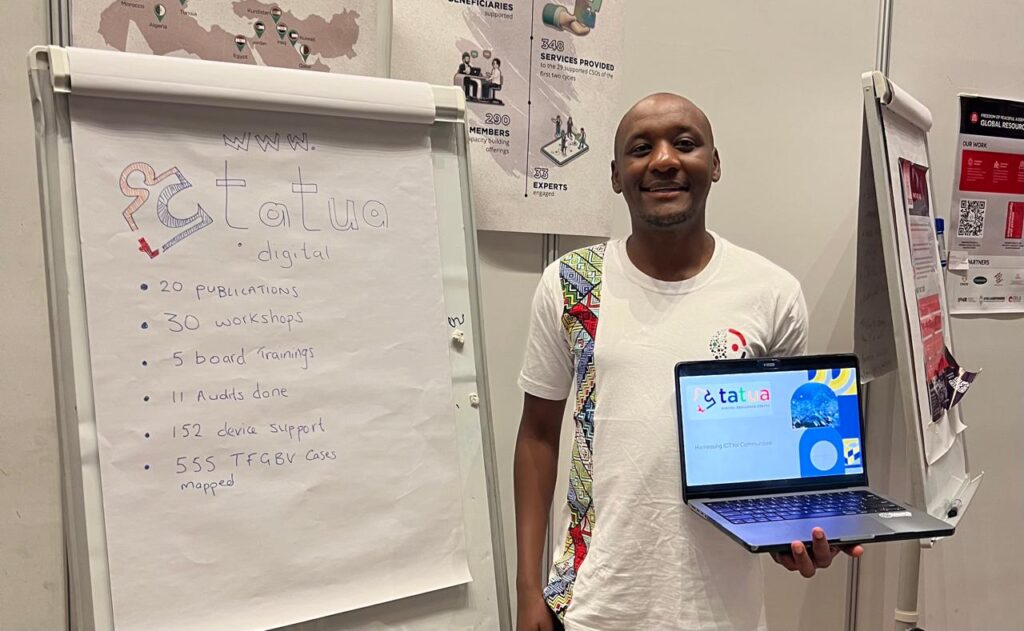8 July 2025, Accra, Ghana.
Civil society leaders and social justice advocates, united by a shared commitment to fortifying civil society in the face of mounting challenges, are meeting under the umbrella of the 2025 Weaving Resilience Network Global Convening, bringing together organizations from across the globe. KICTANet, through the Tatua Digital Resilience Centre—whose work in Kenya, Uganda, and Tanzania supports social justice organizations navigating the complexities of the digital age—is among the key participants at this pivotal gathering.
This year’s convening could not be more timely. Civil society organizations (CSOs) worldwide are grappling with shrinking civic space, funding cuts, and the rise of authoritarianism. The Weaving Resilience Initiative, launched in 2022, was conceived as a direct response to these pressures, aiming to bolster the capacity and sustainability of CSOs. Now, as the initiative approaches its fifth year, the Accra gathering serves as both a celebration of achievements and a strategic forum for charting the future.
The agenda is rich and purposeful, blending opening ceremonies, collaborative storytelling, and deep dives into the changing political and operational environments facing CSOs. Sessions are intentionally designed for horizontal learning, where peer-to-peer exchange and mutual support are prioritized over traditional top-down instruction. This approach not only builds solidarity but also seeds context-responsive strategies for sustaining movements and organizations in an ever-evolving landscape.
The scale and impact of the Weaving Resilience Network are nothing short of remarkable. Represented in 40 countries, the network has, over the past four years, convened 1,572 workshops attended by 4,026 organizations. In addition, 206 webinars have brought together 5,312 organizations, while 372 courses have been completed by 2,873 organizations. Perhaps most impressively, 6,214 organizations have received tailored support, underscoring the network’s commitment to meeting the unique needs of its diverse membership.
This global reach is matched by a deep commitment to fostering collaboration, innovation, and collective care. The Accra convening is structured to maximize these values, with sessions dedicated to sharing impactful services, exploring adaptive strategies in the face of rising authoritarianism, and building financial and institutional resilience in an austere funding landscape.
At the heart of the convening are the “Most Impactful Service” presentations, where organizations like Tatua share their stories, strategies, and lessons learned. For Tatua, this is an opportunity to highlight its work in supporting social justice organizations across East Africa. By enabling CSOs to strengthen their digital resilience, Tatua is helping to ensure that the voices of marginalized communities are not only heard but are also protected and amplified in the digital sphere.
Tatua’s approach is practical, focusing on governance, leadership, and adaptive capacity. The Centre equips organizations to navigate the uncertainties of the digital era. Its emphasis on research and risk management ensures that CSOs are prepared for emerging threats, while its inclusive ethos fosters a sense of belonging and shared purpose among all participants.
As the Weaving Resilience Initiative looks beyond 2026, the Accra gathering is a pivotal moment for reflection and forward planning. Discussions are centered on diversifying funding sources, strengthening local and regional networks, and reimagining the future of the social justice sector. The horizontal learning sessions—covering financial sustainability, community-building, communication, and radical care—are equipping participants with concrete strategies and tools to carry the work forward.
The spirit of the convening is one of resilience, equity, and justice. In a world where civil society is under threat, the Weaving Resilience Network and partners like Tatua are demonstrating that collective action, grounded in shared values and mutual support, can create lasting change. As participants depart Accra, they do so with renewed energy, deeper connections, and a shared commitment to building a more inclusive and sustainable future for all.
KICTANet’s Tatua Digital Resilience Centre is at the heart of this transformative work. Guided by a vision of “transformed, safe communities through the power of ICTs,” Tatua’s mission is to promote an enabling environment in the ICT sector that is robust, open, accessible, and rights-based. The Centre’s purpose is clear: to strengthen institutional resilience, enabling organizations to maintain, grow, adapt, and recover in the face of adversity by employing effective digital strategies.
Tatua’s support for CSOs is comprehensive and multifaceted. The Centre works to enhance digital resilience across key domains such as governance, accountability, leadership, organizational culture, situational awareness, innovation, adaptive capacity, research, and risk management. This holistic approach ensures that organizations are not only equipped to withstand external shocks but are also empowered to thrive and lead in their respective fields.
Diversity and inclusion are woven into the fabric of Tatua’s operations. Drawing expertise from across the continent and the global South, the Centre embodies the principle that solutions to local and regional challenges are most effective when informed by those with lived experience and deep contextual knowledge.
Are you a CSO in East Africa in need of digital resilience services? We look forward to collaborating with you. Please fill out this short survey. This tool enables you to review the state of your organisation’s digital resilience. The tool is designed to be taken as a survey in one 30-minute sitting. We request you discuss it with representatives from your IT, communications, management, and programmes teams while filling it.
![]()

